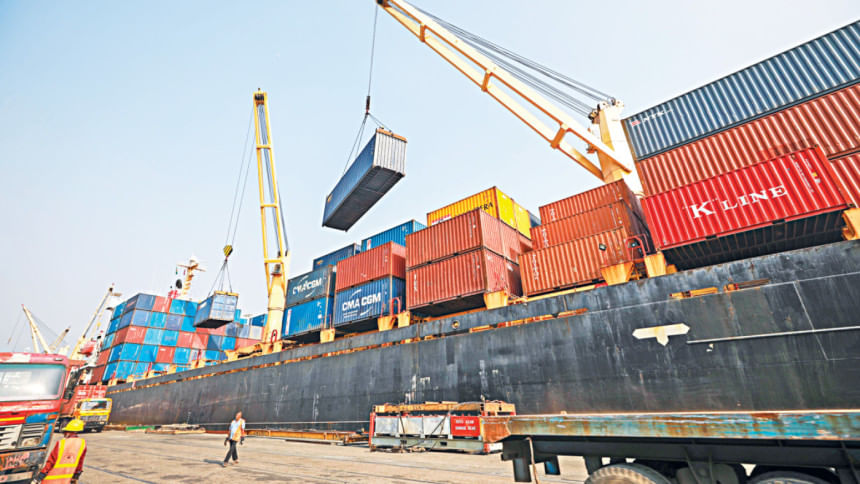The government has taken a series of measures to reform trade policy, modernise ports and facilitate faster movement of goods, as well as develop digital infrastructure to improve the investment climate, according to a statement issued by the Chief Adviser's Office yesterday.
Of the steps, the commerce ministry would amend the import policy order within two weeks, removing quotas on importing raw materials free of charge for fully export-oriented factories.
At present, exporters can bring in up to half the value of raw materials against confirmed export orders without cost. Once the import policy order is revised, they will be able to bring in raw materials without any quota.
"This reform is expected to significantly reduce inventory costs and enhance competitiveness," the CA office said, adding that it could have a substantial impact on exports.
Md Mohiuddin Rubel, a former director of the Bangladesh Garment Manufacturers and Exporters Association (BGMEA), said this decision makes it much easier to handle small, high‑value, and urgent fast‑fashion orders.
"By eliminating in-house bottlenecks, we are accelerating production and reducing costs. Foreign buyers who supply specialised raw materials can now better maintain their required quality, which speeds up order cycles," said the business leader.
The CA office statement also highlighted the launch of the Bangladesh Business Portal in September as a unified online gateway for investors.
The platform aims to combine 29 government services into one system. Thus, it moves to ensure data interoperability with the Bangladesh Single Window (BSW), the Automated System for Customs Data (ASYCUDA), which manages international trade and transport operations, and the Customs Bond Management System (CBMS).
The initiative aligns with Bangladesh's broader digital governance strategy and responds directly to investor feedback, which calls for reduced processing times and enhanced transparency, said the press release issued after a meeting of the investment coordination committee chaired by Lutfey Siddiqi, special envoy on international affairs to the chief adviser.
"We have a long way to go, but we are going there with clear intent, rigour and transparency," Siddiqi said at the meeting.
Bangladesh Bank Governor Ahsan H Mansur, Faiz Ahmad Taiyeb, special assistant to the chief adviser, Bangladesh Investment Development Authority (Bida) Executive Chairman Chowdhury Ashik Mahmud Bin Harun, National Board of Revenue (NBR) Chairman Abdur Rahman Khan, as well as secretaries and business representatives, were also present.
To ease congestion and speed up cargo movement at Chattogram Port, construction of the Laldia yard and Taltala container yard is underway, with the latter's 6.25-acre facility expected to open soon.
To clear more than 6,000 containers currently stuck at the port, auctions have already been held for 403 containers. A seven-member expert committee is also working to establish clear protocols for the disposal of dangerous goods.
The CA Office said new scanner procurement guidelines now allow the port authority to purchase scanners, using specifications provided by the NBR.
According to the statement, in response to private sector requests, the central bank has enabled Real-Time Gross Settlement services at bank branches near ports and is working to ensure round-the-clock availability to reflect the needs of international trade.
"Bangladesh Bank is developing full flowchart documentation of payment procedures for export and import transactions, which will be shared digitally to clearly explain regulatory steps," it said.
According to the CA office, the government has also streamlined business registration and licensing.

